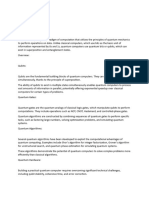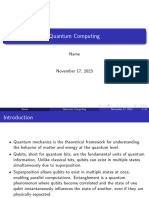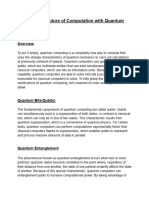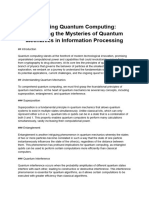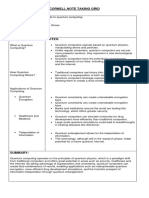0% found this document useful (0 votes)
17 views1 pageLecture Notes: Fundamentals of Quantum Computing
Quantum computing utilizes quantum mechanics principles, such as superposition and entanglement, to process information more efficiently than classical computers. It has the potential to revolutionize various fields through algorithms like Shor's and Grover's, but faces challenges like qubit decoherence and error rates. Significant technological advancements are needed for practical applications of quantum computing.
Uploaded by
dilhanmacysCopyright
© © All Rights Reserved
We take content rights seriously. If you suspect this is your content, claim it here.
Available Formats
Download as DOCX, PDF, TXT or read online on Scribd
0% found this document useful (0 votes)
17 views1 pageLecture Notes: Fundamentals of Quantum Computing
Quantum computing utilizes quantum mechanics principles, such as superposition and entanglement, to process information more efficiently than classical computers. It has the potential to revolutionize various fields through algorithms like Shor's and Grover's, but faces challenges like qubit decoherence and error rates. Significant technological advancements are needed for practical applications of quantum computing.
Uploaded by
dilhanmacysCopyright
© © All Rights Reserved
We take content rights seriously. If you suspect this is your content, claim it here.
Available Formats
Download as DOCX, PDF, TXT or read online on Scribd
/ 1



































